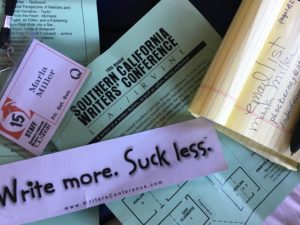Nonfiction Authors, Who Tells Your Story?
 Nonfiction Authors, Who Tells Your Story?
Nonfiction Authors, Who Tells Your Story?
On an eve of returning from SCWC’s 2017 fall conference, I’m inspired to pen a few words about narrator voice.
My workshops had a mix of writers, fiction and nonfiction writers. It is the nonfiction writers-you know who you are-who have inspired this blog.
We write fiction to tell the truth; nonfiction is reserved for telling the facts. What about narrative nonfiction? Should you be penning a story about history or medicine or memoir, in order for readers to keep turning pages, there must be a voice compelling enough to follow. What does this mean? Would you watch a documentary that’s missing a narrator, a voice telling this story? Consider Ken Burns’ documentaries; Viet Nam is currently on PBS. Listen to the Narrator’s voice. Listen for point of view.
The narrator must be informed enough take a position in the telling of your story. Writers of these stories should ask themselves, what inspired me to decide to devote so much time to writing this story? Capture that inspiration on the page and begin retelling your story with that voice, that point of view, infused into the telling. Some writers become inspired because the facts of the story they want to profile on the page are as current today as they were when this story first unfolded. Corral that voice. Integrate that inspiration into your story.
Remember, we read fiction for truth telling, nonfiction for fact finding and narrative nonfiction for a combination, truths told by a narrator whose narrator’s point of view offers a clothesline on which all the collected facts hang. Yes?
Last word: If no one tells your narrative nonfiction story, what keeps potential readers from googling your topic for the facts? Or reading a history book? Or a newspaper?
Great to meet writers I haven’t met in previous SCWC conferences and great to see old friends. This was a special SCWC and I savor memories made.
See many at SCWC’s San Diego conference, February 2018. It rocks, too!


Great to see you again, too, Marla. You and Jennifer Silva Redmond ROCKED your Pitch Witches session and definitely gave me some things to ponder. Thanks for sharing your warmth and wisdom.